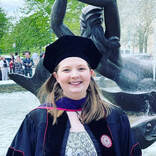 I’m an alumna of FRC Team 45, the TechnoKats, out of Kokomo, Indiana. After I graduated, I went to Purdue University where I majored in chemical engineering, and I was also a member of Purdue FIRST Programs, a group that mentors local FIRST teams and whose members volunteer at FIRST events. My time on my FRC team made me believe I was meant to be an engineer. But about halfway through my time at Purdue, I discovered something about myself: as much as I love STEM and learning about science, an engineering career was not for me. I felt lost. I loved my time on my FRC team, and I still loved science and technology, but I had no idea what I wanted to do if I wasn’t going to be an engineer. I really thought that was what I wanted to do when I started college, but I learned that wasn’t the path I was meant to follow. And you know what? That turned out to be entirely okay. In the chemical engineering school at Purdue, we were required to sit through a seminar class once a year where chemical engineering alumni came to talk to current students about their career paths and answer questions about their jobs so students got an idea of what options were available to them. That’s where I learned I could become a lawyer. One particular Purdue alum who came to talk to us worked as an intellectual property (IP) attorney for a major corporation. Many IP attorneys have STEM degrees from their undergraduate institutions, giving them the ability to analyze patent law and applications. It’s important to note here that I was one of those kids whose parents always said, “You’re going to be a lawyer one day.” Whenever I got into arguments with my parents or my siblings, I always had some kind of evidence or something to back me up, much to the chagrin of everyone in my family, because I was determined to be right. So, sitting in that lecture hall in the chemical engineering building, knowing I didn’t want to be an engineer, I started thinking more about what my parents told me when I was younger, and I asked myself: what if I went to law school? Going to law school meant I didn’t have to change my major (and add on more time and take out more loans) because I could have whatever undergraduate degree I wanted and still be accepted into law school. So, I finished my degree at Purdue, applied to law schools during my final year, and then went on to law school. I just graduated from Indiana University Maurer School of Law with my law degree, and I’m confident this is where I’m meant to be. What does this have to do with STEM and FIRST? Full disclosure: I will not be an IP attorney, so I will not be in the STEM-focused area of law that IP law generally entails. But, I still used what I learned in FIRST and at Purdue every day of law school, and I’m sure I’ll continue to use those skills as I (finally!) begin my full-time job. In law school, you naturally have to do a lot of reading. You have to study the reading and be prepared to answer questions in class. My time at Purdue (which required hours and hours every night of tricky engineering problems) taught me how I study best, so law school was not an incredibly difficult leap for me in that area. Law school is also special in that you can engage in conversations with your peers about how various laws or theories impact different areas of life, bringing in your background and life experiences to discuss their applications. My time on my FRC team taught me how to work with all kinds of people, as well as how to communicate with different groups. It is not uncommon for engineers to struggle to communicate about their work or projects with non-engineers, and the same is true for lawyers and non-lawyers. Being on my FRC team taught me how to tweak my language to bridge the gap and talk to people from all walks of life. This helped me discuss different theories from different classes with my friends and peers, who had a variety of undergraduate degrees. In that sense, my time on an FRC team prepared me for law school in ways I could never imagine. What do I want you to take away from this post? There are two things. First, I want to reassure any of you who are reading this that even if you love FIRST and STEM, but maybe you think you don’t want to pursue a degree in engineering or technology, you totally can! Do not feel guilty about pursuing a career that speaks more to your skills or interests than one in a STEM field, and remember that FIRST is about more than robots. It’s about growing as an individual, learning how to work on a team, and building a diverse skill set that gives you a fruitful career that you enjoy. Second, and perhaps more importantly, I want to emphasize that FIRST prepares you for careers beyond STEM. As I said before, I learned both on my FRC team and as a volunteer how to work and communicate with lots of different groups. I’ve learned how to problem solve. I’ve discovered how I learn best. I’ve learned how to grow as an individual and a leader. I feel confident saying I would not be who or where I am had I not joined my FRC team all those years ago. I am grateful every day for those experiences, and I can’t wait to see how I continue to use and grow those skills as a working professional. I want to encourage anyone reading this to follow your passions. Even if you end up taking a winding path like I did, you’ll eventually end up where you want to be. FIRST made that possible for me, and it will do that for you, too. This blog was written by Kija Davis, alumna of FRC Team 45, the TechnoKats. If you are interested in blogging for FIRST Ladies, click here to sign up on the schedule!
0 Comments
|
Be a guest
Do you want to be a guest blogger for FIRST Ladies? You can write about a topic of your choice! Anyone can submit a blog, especially our Regional Partner teams! Please email us the a Google Doc of the completed blog. Thank you! Archives
April 2024
|

 RSS Feed
RSS Feed
